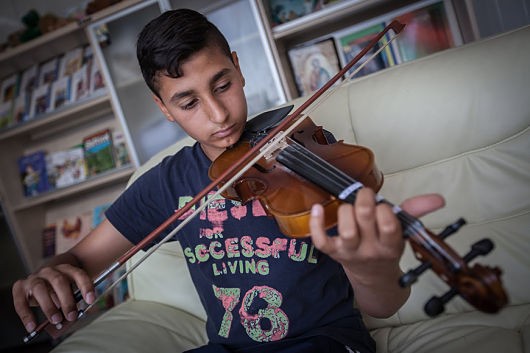In an Iraqi Kurdistan Refugee Camp, Education is Key
 There has been no shortage of news in the past year about the refugee situation wrought by the activities of the Islamic State (IS) in Iraq and Syria, which has displaced an approximate 1.8 million Iraqis this year — 800,000 of whom have fled to safer Iraqi Kurdistan. Currently home to one of the largest numbers of internally displaced peoples (IDPs) in the world, according to UNESCO, facilities in Iraqi Kurdistan have struggled in the past year to compensate for the strain placed upon them by refugees and IDPs.
There has been no shortage of news in the past year about the refugee situation wrought by the activities of the Islamic State (IS) in Iraq and Syria, which has displaced an approximate 1.8 million Iraqis this year — 800,000 of whom have fled to safer Iraqi Kurdistan. Currently home to one of the largest numbers of internally displaced peoples (IDPs) in the world, according to UNESCO, facilities in Iraqi Kurdistan have struggled in the past year to compensate for the strain placed upon them by refugees and IDPs.
However, often overlooked in the news are the smaller stories of hope, which residents of these refugee camps are attempting to stake out a better future for themselves and their children.
One such tale can be found in the Mar Elia refugee camp in the Christian neighborhood of Ankawa, located in the larger region of Erbil; the unofficial capital of Iraqi Kurdistan.
Opened by Douglas al-Bazi, Mar Elia started out as an empty lot surrounding al-Bazi’s office in the Mar Elia Chaldean Church. Today, however, the refugee camp holds 500 displaced refugees—most of whom are Christians and also boasts enviable facilities for its residents such as a large playground, a volleyball court, ping-pong tables, and a set of swings.
The most important features of the camp, however, are the two classrooms that flank either side of the camp’s entrance. These classrooms, which are stocked with books, textbooks, and musical instruments, reflect the most unusual aspect of the Mar Elia camp, the emphasis placed upon education.
According to al-Bazi, he has received a lot of criticism for spending so much money on education from workers in neighboring camps in the Erbil region of Iraqi Kurdistan, such as Baharka, which hosts 4,000 displaced Iraqis yet receives fewer funding. Mar Elia, with its unique focus on education, seems out of place compared to the dozens of other poorly-funded camps built in Iraqi Kurdistan, which have sprung up since IS seized several cities in the Northern area of Iraq in the summer of 2014–including the mostly Christian area of Mosul.
Al-Bazi, however, has countered these critiques by arguing that “it’s not empty stomachs that destroyed [Iraq]; it’s empty minds.” Al-Bazi also believes that “it’s easy for IS to thrive among abandoned people”–especially among refugee youths who have been mentally abandoned by a strained aid system that has struggled to meet the educational needs of the thousands of IDPs living within Iraqi Kurdistan.
Al-Bazi thus believes that education can provide a mental shield to children and youths living in Mar Elia; which can in turn protect them from being sucked into the activities and lure of the Islamic State.
Commenting on the situation in Iraq, Zayad Abdulqadir, Advisor to the Minister of Education in the Kurdistan Regional Government stated that “as the number of IDPs in Kurdistan increases due to the crisis in Iraq, Kurdistan faces the difficult challenge of providing educational opportunities for all of them.”
In the midst of this, students and inhabitants of Mar Elia, who are called “relatives” by Mar Elia volunteer, continue to take daily lessons from a variety of courses on offer such as violin lessons.
Next year, al-Bazi hopes to include Spanish and Italian lessons in the Mar Elia curriculum.
– Ana Powell
Sources: Al-Fanar Media Al Monitor, UNESCO
Photo: Al Monitor
